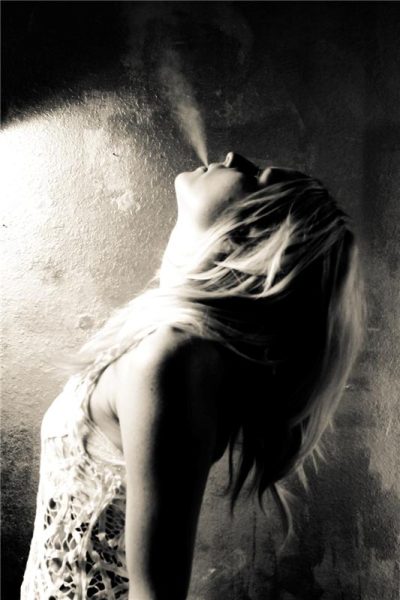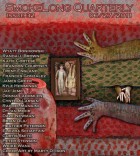The story is beautiful and intriguing. As I read it aloud over and over, little stories spring forth. Is it:
A. A meta-essay on how literature asks the reader to bring about the rest of the story?
B. A complete fiction of interconnected elements that we should already know?
C. A hypnosis trying to elicit déjà vu in the reader?
D. A poem?
E. _________?
I love the multiple choice! For choice E, I could offer, of course, “All of the above,” and I have to admit I’m happy to think a reader might consider one or all of the possibilities you’ve listed. I could also offer “E. A steganographic message,” and I think that might touch upon the (certainly somewhat metafictional) intentions that drove the piece for me
as I wrote it.
Is there a hidden message here for the reader? The tattoo, is it related to the footprints in the snow for the author, or only for some readers?
What intrigued me about steganography was the way it was defined when I first heard about it in a computer science class: “encryption that doesn’t look like encryption.” Once I looked up steganography, the magic could have gone out of the term, but I read about it long after I’d first heard that definition, and so it was too late: to me it did not matter what steganography was or what it was used for (I couldn’t tell you what it was used for in the operations taught in that programming class!), only that the word suggested that anything might hold secret meaning, meaning to which we might be privy if we know not just the code but that a message has been sent. If we don’t know for sure that a message has been sent, well then, I suppose we have to read everything carefully, or risk missing something, maybe something important.
In some ways, I did want the list that comprises the story to be long and varied enough to suggest “everything,” but of course I did select these particular details and not others, so the everything I’ve invoked here could be read as a particular everything, though not my everything, I should hope. The reader’s everything, perhaps, at least for the moment he or she dwells in the story. The collective everything created by reading itself. Is the tattoo related to the footprints in the snow? I would say yes, they are related, in the sense that both contain human meaning, no doubt a great deal of it.
I love this haunting conclusion: “The code you’re meant to crack has no time for games. It will flit into your life suddenly, unannounced, and then move on.”
Are stories in the memory of the writer or the reader? Is there a collective déjà vu that literature taps into?
I find it interesting that you emphasize memory here, suggesting that the litany of items and experiences in the story comes from the past, in which case what would haunt the reader might be a sense of regret over the messages he or she has possibly missed. I did hope for the ending to haunt the reader, even to haunt with urgency — the urgency of meaning that is often overlooked, often with grave consequences (consequences that might themselves be overlooked, or misread). In that sense the story contains messages that surround the reader in the present, or are yet to appear; they are not yet memories. But I think your question reveals the fact that as each of the possible “encryptions” unfolds, it becomes memory, even the memory of something that has just occurred, which can be more powerful than the occurrence itself.
So when the story says “Watch closely,” it could indeed be warning readers to interrogate their memories as well. I’ll rephrase that: the warning without doubt applies to the interpretation of memory, including the memory of fictional stories, as much as anything else — fictional stories are memories that none of us actually experienced but that we might all recall. This comes back to the idea of literature as a collective “everything,” a universe that, because it tries to make sense of things, sometimes feels more common to all of us than the universe we actually inhabit. I wonder if that is literature’s “collective déjà vu,” the one that plays itself out in the life of the reader once the reading is done and the story resonates out there in the world, a sense of meaning everyone who has read the work might share.
The story might have been driven, in part, by a sort of panic I’ve been experiencing over the lack of reading for meaning I feel I’m witnessing in everyday life. A friend of mine who is a therapist read this piece and thought of her schizophrenic patients, who are pathologized for finding the steganographic message in everything — of course, their belief that meaning is ever-present can be debilitating. It occurs to me that at the other end of the spectrum we might find my lovely Harvard students, whom I’ll single out for their enviable spot at the top of our societal heap. In their earnestness and their drive to do well, they frequently strike me as mice in a maze, chasing down the cheese, which they do expertly — “effectively” and “successfully,” to use their own terms. But they do not consider, nor are they encouraged to consider, the nature of the maze: what forces built it and why, and whether there might be another way.
My sense of the world as I know it today is that few of us linger in the place between these supposed extremes, a place where we search consciously for meaning in what’s going on around us, even and especially the small things. My sense is that we avoid alertness to meaning because the meaning surrounding us at the present moment is too painful.
Writing this story brought into focus for me the notion that artists — including writers — might linger in that in-between place, or at least the story solidified for me the hope that they do. In saying “Watch closely,” then, I think I am also addressing myself.
Tell us about the novel you are writing. Are you dealing with memory?
The book is set in the past, which raises all kinds of questions of memory — not personal memory, since the story takes place around the turn of the twentieth century, but collective memory, the past as we think we know it. One of the main characters in the book is preoccupied with the idea that she is in the midst of a significant shift, that there was a time before the present one that was quite different from the one she is living in now, though the change she believes she has experienced is so profound she no longer feels equipped to understand what came before. I feel that way about the past, and that’s why I’m drawn to it. That, and the fact that I’ve given myself the task of depicting the first American department stores, which seem to have cast all kinds of interesting spells on an already bewitching urban culture. Right now, the book is called The Phineus Masters Academy for Girls, or, Seduction.



 The core workshop of SmokeLong Fitness is all in writing, so you can take part from anywhere at anytime. We are excited about creating a supportive, consistent and structured environment for flash writers to work on their craft in a community. We are thrilled and proud to say that our workshop participants have won, placed, or been listed in every major flash competition. Community works.
The core workshop of SmokeLong Fitness is all in writing, so you can take part from anywhere at anytime. We are excited about creating a supportive, consistent and structured environment for flash writers to work on their craft in a community. We are thrilled and proud to say that our workshop participants have won, placed, or been listed in every major flash competition. Community works.